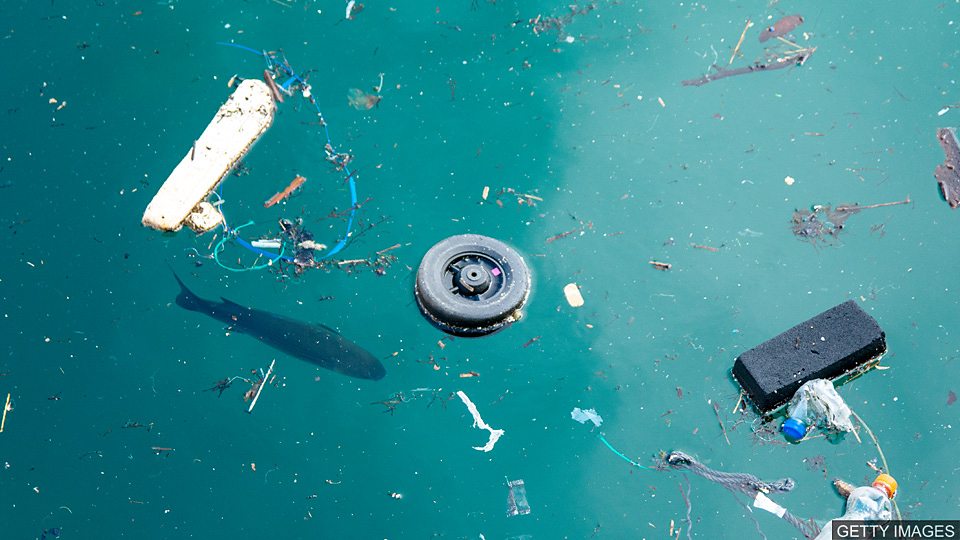科学家们发现,大西洋上漂浮着的微塑料碎片总重在1200万吨到2100万吨。由英国国家海洋学中心(National Oceanography Centre)领导的一项研究,研究团队在穿越大西洋中部的一次考察中对海平面以下200米(650英尺)内的海水进行了测量。
In the decades that our discarded plastic waste has been finding its way into the environment, much of it is broken down into tiny pieces too small for us to see.
几十年来,我们丢弃的塑料垃圾已经进入了自然环境中,其中很多被分解成了肉眼无法看到的微小碎片。
So, Dr Katsia Pabortsava, from the National Oceanography Centre in Southampton, led an expedition to find all that missing microplastic – particles, smaller than the diameter of a human hair – floating in the Atlantic.
因此,来自英国南安普顿国家海洋学中心的卡茨亚·帕波尔茨亚娃博士(Dr Katsia Pabortsava)带领了一支考察队去寻找漂浮在大西洋上所有分解得不见踪影的微塑料碎片,这些碎片的大小小于人类头发的直径。
On that expedition from the UK to the Falklands, Katsia used what's essentially a large ocean-going sieve with a very fine mesh to drag through the top 200 metres of the sea at different locations. That revealed that up to 21 million tonnes of microplastic is floating in those upper layers of the ocean.
在这次从英国到福克兰群岛的考察中,卡茨亚使用了一个本质上适合远洋探索的巨大滤筛,滤网的网眼十分细密,在不同的地点滤过海平面以下200米内的海水。结果表明,有多达2100万吨的微塑料碎片漂浮在海洋的上层。
The team only analysed their samples for the three most commonly used packaging plastics. So, they say their estimate is actually likely to be conservative.
这个团队只对他们采集样品中最常见的三种包装塑料进行了分析。因此,他们表示他们估算的数据实际上很可能是保守的。
But what these tonnes of microscopic fragments show is that decades of plastic pollution has been washed from rivers or even blown on the wind into the ocean.
但这些成吨的微型碎片表明,几十年来的塑料污染已经从河流中被冲走,甚至被风吹入了海洋。
词汇
discarded 丢弃的
broken down 被分解的
expedition 考察
microplastic 微塑料
particles 微粒,粒子
sieve 过滤器
mesh 滤网
packaging 包装材料
conservative 保守的,低估的
fragments 碎片
阅读理解:请在读完上文后,回答下列问题。
1. True or false? The particles of microplastic are bigger than the diameter of a human hair.
2. What tool did Dr Katsia use to take samples of microplastic in the ocean?
3. Why did the team say their estimate of 21 million tonnes of microplastic is likely to be conservative?
4. According to the text, what do these tonnes of microscopic fragments show?
答案
1. True or false? The particles of microplastic are bigger than the diameter of a human hair.
False. They are smaller than the diameter of a human hair.
2. What tool did Dr Katsia use to take samples of microplastic in the ocean?
Dr Katsia used what's essentially a large ocean-going sieve with a very fine mesh to drag through the top 200 metres of the sea at different locations.
3. Why did the team say their estimate of 21 million tonnes of microplastic is likely to be conservative?
Because they only analysed their samples for the three most commonly used packaging plastics. So, there is likely to be more in the Atlantic Ocean.
4. According to the text, what do these tonnes of microscopic fragments show?
They show that decades of plastic pollution has been washed from rivers or even blown on the wind into the ocean.


 3342次下载
点击下载
3342次下载
点击下载
 2621次下载 点击下载
2621次下载 点击下载
 4734次下载 点击下载
4734次下载 点击下载
 1854次下载 点击下载
1854次下载 点击下载
 1391次下载 点击下载
1391次下载 点击下载
 1391次下载 点击下载
1391次下载 点击下载











